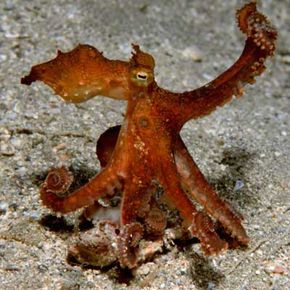Quck answer
Octopuses are highly intelligent and adaptable creatures that can change color and texture to blend in with their surroundings. They have eight arms, each covered in suction cups, which they use to catch prey and manipulate objects. Octopuses also have three hearts and a complex nervous system that allows them to problem-solve and learn from experience. They are able to squeeze through tiny spaces and escape from predators by releasing ink and jetting away. Overall, octopuses are fascinating creatures with unique abilities that continue to be studied and admired by scientists and nature enthusiasts alike.
Wild Animals
Octopus Behavior and Personality Research

Octopuses are known for their intelligence and ability to adapt to different situations. Researchers have been studying these creatures to learn more about their behavior and personalities. Octopuses are considered intelligent creatures, as they have been known to escape from their aquariums and solve problems like mazes and picking up specific colored balls. Researchers have also found that octopuses have personalities. Marine biologist Jennifer A. Mather conducted a study on octopus personalities by identifying different personality traits and rating each animal against them. The study found that octopuses displayed 19 distinct behaviors, which were categorized into three buckets: activity, avoidance, and reactivity. Octopuses were also found to apply their intelligence to practical situations, such as changing their eating methods when presented with different prey. The study concluded that octopuses are intelligent and have unique personalities.
Related Articles
- Learn about the functioning of Squids
- Discover why the blood of Octopuses is blue
- Explore how Octopuses can disguise themselves as other animals
- Find out how Sharks function
- Learn about the anatomy and behavior of Whales
Sources
- “A Legend of the Deep” Nature. PBS Educational Broadcasting Corporation. http://www.pbs.org/wnet/nature/octopus/legend.html
- “Cephalopod.” Microsoft Encarta Online Encyclopedia. 2007. http://encarta.msn.com
- “Cephalopods.” Smithsonian National Zoological Park. https://ocean.si.edu/ocean-life/invertebrates/cephalopods
- “Common Octopus.” National Geographic. http://animals.nationalgeographic.com/animals/invertebrates/common-octopus.html?nav=A-Z
- “Giant Pacific Octopus.” National Geographic. http://animals.nationalgeographic.com/animals/invertebrates/giant-pacific-octopus.html
- Helm, Burt, and Adam Aston. “Taking Lessons in Optics from the Octopus.” Business Week. (Jan 31, 2005): 62. (Jan. 26, 2008) http://find.galegroup.com/ips/start.do?prodId=IPS
- Mather, Jennifer A. “Eight Arms, with attitude: octopuses count playfulness, personality, and practical intelligence among their leading character traits.” Natural History 116.1 (Feb. 2007): 30(7). https://www.bennington.edu/sites/default/files/sources/docs/Sherman_eight%20arms.pdf
- Mayell, Hillary. “Octopus Arms May Point Way to New Robot Designs.” National Geographic News. Feb. 9, 2005 https://www.mail-archive.com/europa@klx.com/msg04406.html
- “Mollusk.” Microsoft Encarta Online Encyclopedia 2007. http://encarta.msn.com
- “Not such suckers.” The Economist (US) 319.n7711 (June 15,1991): 82(2) (Jan. 27, 2008) http://find.galegroup.com/ips/start.do?prodId=IPS
- Pickrell, John. “‘Walnut-Size’ Male Octopus Seen Alive for First Time.” National Geographic News. Feb. 12, 2003.
- Roach, John. “Newfound Octopus Impersonates Fish, Snakes.” National Geographic News. Sept. 7, 2001. http://news.nationalgeographic.com/news/2001/09/0920_octopusmimic.html
- Roach, John. “Octopus Arms Found to Have ‘Minds’ of Their Own.” National Geographic News. Sept. 7, 2001 http://news.nationalgeographic.com/news/2001/09/0907_octoarm.html
- Scheel, David. “Giant Octopus: Fact Sheet.” August 10, 2001. http://marine.alaskapacific.edu/octopus/factsheet.html
- “Sea Chameleons.” Nature. PBS Educational Broadcasting Corporation. http://www.pbs.org/wnet/nature/octopus/chameleons.html
- Stewart, Doug. “Armed but not dangerous: is the octopus really the invertebrate intellect of the undersea world?” National Wildlife 35.n2 (Feb-March 1997): 32(8). (Jan. 27, 2008) http://find.galegroup.com/ips/start.do?prodId=IPS
- Wheeler, K. and D. Fautin. 2001. “Cephalopoda” (on-line), Animal Diversity Web. (Jan. 25, 2008) http://animaldiversity.ummz.umich.edu/site/accounts.information/Cephalopoda.html
- “Wizards of the Sea.” National Geographic Kids. (Feb. 5, 2008) http://www.nationalgeographic.com/ngkids/0410/index.html
FAQ
1. What is an octopus?
An octopus is a cephalopod mollusk with a soft, sac-shaped body and eight tentacles. They belong to the same family as squids, cuttlefish, and nautiluses.
2. How do octopuses move?
Octopuses move by contracting and expanding their muscles to push water through their gills and out of their siphon. They can also crawl along the seafloor using their tentacles.
3. How do octopuses breathe?
Octopuses breathe by extracting oxygen from water through their gills. They have three hearts that pump the oxygen-rich blood through their body.
4. What do octopuses eat?
Octopuses are carnivores and eat a variety of prey including crabs, shrimp, fish, and mollusks. They have a sharp beak that they use to break open the shells of their prey.
5. Can octopuses change color?
Yes, octopuses can change color and texture to blend in with their environment or communicate with other octopuses. They have specialized cells called chromatophores that allow them to change color rapidly.
6. Do octopuses have good eyesight?
Octopuses have excellent eyesight and can see in color. They have large, complex eyes that are similar to human eyes in structure.
7. How do octopuses reproduce?
Octopuses reproduce sexually and have separate sexes. The male octopus uses one of his arms to transfer a packet of sperm called a spermatophore to the female’s mantle cavity.
8. How long do octopuses live?
Octopuses have a relatively short lifespan of 1-2 years, although some species can live up to 5 years in the wild.
9. Are octopuses intelligent?
Yes, octopuses are considered to be highly intelligent and have a complex nervous system. They have been observed using tools, solving puzzles, and even playing.
10. Can octopuses regenerate limbs?
Yes, octopuses have the ability to regenerate lost limbs. This is due to their unique ability to grow new tissue and cells quickly.
11. Are octopuses dangerous?
While octopuses are not typically dangerous to humans, some species, such as the blue-ringed octopus, are venomous and can be deadly.
12. Are octopuses social creatures?
Octopuses are generally solitary creatures and do not interact with other octopuses unless it is for mating purposes. However, some species have been observed living in groups and even cooperating with each other.





Leave a Reply